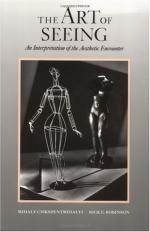|
This section contains 7,380 words (approx. 25 pages at 300 words per page) |

|
The philosophical discipline of aesthetics deals with conceptual problems arising out of the critical examination of art and the aesthetic. Monroe Beardsley subtitled his 1958 book on general aesthetics Problems in the Philosophy of Criticism, implying that aesthetics is about philosophical concepts that are used—often unthinkingly—by critics of the arts, when they say that a work of art such as a painting is beautiful or has aesthetic value, that it represents some subject matter, has a well-composed form, is in a particular style, and expresses some emotion. But aesthetics also deals more broadly with the aesthetics of nature (Budd 1996, Carlson 2000) and gardens (Ross 1998), and with the aesthetic appreciation of objects and activities in everyday life (Dewey 1934). And even when focused on the arts, philosophical aesthetics is concerned with the philosophical problems that arise from the artist's point of view as well as the...
|
This section contains 7,380 words (approx. 25 pages at 300 words per page) |

|


